
Wisdom's Works
“But wisdom is justified by all her children.”
Lord of the Dance
Logos and Sophia
Christ is the Word of God (logos M John 1:1)
Christ is the Wisdom of God (sophia Ephesians 1:24)
![]()

Logos and Sophia
Christ is the Word of God (logos M John 1:1)
Christ is the Wisdom of God (sophia Ephesians 1:24)
![]()

This article suggests that the Wisdom of God, personified as a woman, has a major role in changing times--when God transitions to a new house management program.
Moms are very important in a household. Even bachelor pads and fraternities are far better off if they employ a live-in house mother. Whoever heard of a nursery run by men, or a nursing home or hospice with only male caregivers? Wise women, like Esther are scarce but worth their weight in gold.
 God is Three Persons, not Four. Each of the Three is described using masculine nouns and pronouns. There is no Fourth Person in the godhead as some have suggested! The God of the Bible is not a sexist. Fifty percent of life can only be understood by referencing a woman's point of view. The Old Testament seems to many people to be all-male. Not so! (See Made in the Image of God). God made "Adam/Eve" in His own image, He subsequently separated the man whom He had made into two---Adam and Eve. Thus, an original unity of "man" was replaced by a division into two complementary opposites.
God is Three Persons, not Four. Each of the Three is described using masculine nouns and pronouns. There is no Fourth Person in the godhead as some have suggested! The God of the Bible is not a sexist. Fifty percent of life can only be understood by referencing a woman's point of view. The Old Testament seems to many people to be all-male. Not so! (See Made in the Image of God). God made "Adam/Eve" in His own image, He subsequently separated the man whom He had made into two---Adam and Eve. Thus, an original unity of "man" was replaced by a division into two complementary opposites.
The image of God in our race is therefore carried by the man and the women in equal weight. Whatever other terms we may wish to associate with man being made in the image and likeness of God, the existence of two separate sexes is a very important part of the image of God which we, as men and women, jointly bear. It is as if half of life is to be understood and interpreted from a man's point of view and half from a woman's point of view. These two points of view are not identical nor opposites, nor polarities, they are complementary! This topic is often discussed under the heading "Wisdom Literature."
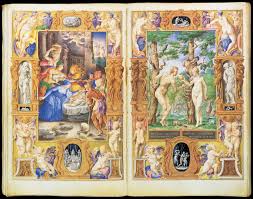 The existence of two sexes and the fact that it takes male and female persons to adequately reflect the nature of God implies that the Being of God is as much masculine as it is feminine. This is a difficult concept because God does not describe Himself as a sexual being. All the persons of the Godhead are called by masculine nouns and pronouns in our English Bibles. The godhead is three Persons, not two!
The existence of two sexes and the fact that it takes male and female persons to adequately reflect the nature of God implies that the Being of God is as much masculine as it is feminine. This is a difficult concept because God does not describe Himself as a sexual being. All the persons of the Godhead are called by masculine nouns and pronouns in our English Bibles. The godhead is three Persons, not two!
Masculine headship is another topic! Furthermore the godhead consists of a union of Three Persons, not two, as in human marriage. Please see Logos and Sophia. Sadly our society suffers today from deep-seated gender confusion. Everyone knows it, but the fix eludes us.
From Ray Stedman:"The significance of Adam as a male/female being becomes apparent when we remember that the Lord Jesus Christ came as a Second Adam. He was all that Adam was. "It behooved him," said the writer to the Hebrews "that he be made exactly like us, except for sin," (Hebrews 2:17). He became the second Adam, and therefore he, too, was a male/female being. I stress the fact that this duality was not physical -- he was not a freak, a hermaphrodite but psychologically he combined within himself all the elements of male and female characteristics. It has been often noted, in reading the Gospel accounts of Jesus, that he combined in himself the sternness and strength of the male, with the tenderness and gentleness of a woman. He manifested both in perfect balance and in equal degree.
This is why men, viewing the Lord Jesus Christ, see in him the man, the manliest of men; while a woman, viewing the same remarkable person, sees in him one who thoroughly understands and empathizes with a woman's nature, able to enter into all her feelings and reactions.
We know from the Scriptures that all the races were in Adam. The different colors and all the distinctions which we say mark race are merely superficial distinctions which were all derived from one source, created by various forces playing upon a single race of man. As you trace mankind back to its source in Adam they all disappear. All races were in Adam, and thus, all races are in Christ. He shares the characteristics of every race on earth. This is why he is such a universal figure, why, wherever Jesus Christ is preached among various people, they culturally identify with him instantly. He combines their cultural distinctives in himself.
Likewise both of the sexes are in Christ, so that Christian character is exactly the same, whether it is found in a man or in a woman. The tenderness, the gentleness, the softness of Christian love is exactly the same in a man as in a woman. The strength and sternness and sturdiness of Christian courage is exactly the same in a man or in a woman, it makes no difference. This is why Paul could write to the Galatians and say to them, at the close of Chapter 3, "There is neither Jew nor Greek, there is neither slave nor free, there is neither male nor female; for you are all one in Christ Jesus," (Galatians 3:28 RSV). All this is wrapped up in these amazing words in the opening chapter of Genesis where we are told that Adam was created a male/female being. Thus we have a key to the makeup and character of the second Adam.” Sex and Food (1967).
The universe is God's house! He created it, He owns it, He is running the place. You and I are house guests for a short sojourn because the Owner loves us and wants us to know Him personally. He is very grand Person.
To cite one instance of a woman's worth please read Elaine Stedman's classic book, "A Woman's Worth."
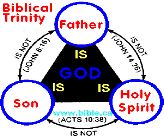
Many today live with an incomplete understanding of the nature of God. Indeed He IS Love but not Hollywood Love, Romantic Love, Sentimental Love, Wishful Love. God is self-giving.
'Even before the universe was created the three Persons in the godhead poured themselves endlessly into one another in a dance called "The Procession of the Godhead."
The church is also called "the Body of Christ." This is a masculine figure of the soldier, the warrior, the kingly. Jesus is the Head of the Body, He sends resurrection life and spiritual nourishment through the entire body. Wherever the Body of Christ is in the world, there also is the Lord Jesus. Jesus indwells His church. Thus in relationship to the world, the church is masculine. The church as seen by the world is a mighty army! Masculinity and femininity are thus inner and outer aspects of the same reality---which ultimately reflects something of the perfect union of the Persons in the godhead. Jesus has joined Himself to the church which is His Body---where the church is, there He is also.
"Who is this who looks forth like the dawn, fair as the moon, bright as the sun, terrible as an army with banners?" (Song 6:10)
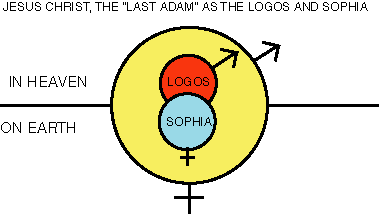
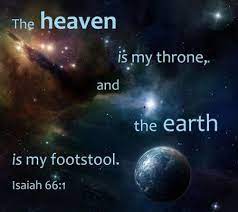
 From time to time God changes the House Rules. He Himself does not change, nor can He change, but His ways of managing His affairs with us tenants does change. In fact, the Owner will be returning to earth soon and on schedule!
From time to time God changes the House Rules. He Himself does not change, nor can He change, but His ways of managing His affairs with us tenants does change. In fact, the Owner will be returning to earth soon and on schedule!
This word, dispensation, οἰκονομία is a biblical word. It is found in the King James Version in several places. It comes from a Greek word, oikonomia, from which we get, in English, "economy." In the Revised Standard Version it is usually translated stewardship or, in some places, plan. It appears in Ephesians 1:10 where the Apostle Paul speaks of "a plan for the fulness of time."
In Ephesians 3:9, Paul speaks of a dispensation or stewardship which was committed to him, which he calls "the plan of the mystery hidden for ages in God who created all things." This is the word we are dealing with. Literally, it really means "the law of the house" --oikos is house and nomus is law; so oikonomus is "the law of the house." It has to do with order and regulation within a household. (RCS)
“In Christ we have redemption through His blood, the forgiveness of sins, according to the riches of His grace which He made to abound toward us in all wisdom and prudence, having made known to us the mystery of His will, according to His good pleasure which He purposed in Himself, that in the dispensation of the fullness of the times He might gather together in one all things in Christ, both which are in heaven and which are on earth--in Him. In Him also we have obtained an inheritance, being predestined according to the purpose of Him who works all things according to the counsel of His will, that we who first trusted in Christ should be to the praise of His glory." (Ephesians 1:4-12)
All signs point to a change in the dispensations happening now, starting in 2020. God is taking a more active role at last in human history? It appears to many of us that we are now entering a New Dispensation as the Landlord/Owner, moves on stage at last, orchestrating and directing the saga of mankind and the history of the world. (Don't take my word for any of this. Do your own homework.)
The last time God made a major change in Dispensations was in the year 30 A.D.
Previous changes of importance happened when Adam and Eve ate from the forbidden tree of the knowing of good and evil. They were exiled from the Garden of Eden. A big change in house-management changed at the time of the Flood, in Noah's day, The world went through a major change at the Tour of Babel when God scattered the clumped inhabitants, confounding the original one language into many. The arrival of the man called Abraham (about 2200 B.C.) sent mankind a message that there was only one true God, not many. Moses (about 1600 B.C.) brought in the Law of Moses revealing much more about who the real God was--what He liked and what He abhorred. Then came Jesus.
"...heirs, as long as they are minors, are no better than slaves, though they are the owners of all the property; but they remain under guardians and trustees until the date set by the father. So with us; while we were minors, we were enslaved to the elemental spirits of the world. But when the fullness of time had come, God sent his Son, born of a woman, born under the law, in order to redeem those who were under the law, so that we might receive adoption as children. And because you are children, God has sent the Spirit of his Son into our hearts, crying, ‘Abba! Father!’ So you are no longer a slave but a child, and if a child then also an heir, through God. Formerly, when you did not know God, you were enslaved to beings that by nature are not gods....(Galatians 4:1-8)
What happened in A.D. 30? Two men, cousins actually, showed up. John the Baptist, from tribe of Judah, six months older than his cousin Jesus, was God's man to let everyone know the long awaited Messiah had arrived. This had been predicted four hundred years earlier by the Hebrew prophet Malachi:
This prophecy of Malachi was given by a man whose name means "my messenger." It is most suggestive that this last book of our Old Testament centers around the theme of a messenger of God and a prediction of the coming of another messenger. In this, therefore, we have a direct tie between Malachi and the New Testament. Chapter 3, for instance, begins with this prophecy:"Behold, I send my messenger [in Hebrew that would be "Behold, I send Malachi"] to prepare the way before me..." (Malachi 3:1a)And as you discover in the book of Matthew, that messenger was John the Baptist. He came to prepare the way of the Lord and to announce the coming of the second messenger from God. That second messenger is here in this prophecy in the next phrase:"...and the Lord whom you seek will suddenly come to his temple; the messenger of the covenant..." (Malachi 3:1b)It was the work of the Lord Jesus on the closing night of his ministry to take wine and bread with his disciples and holding the cup up to say, "This is my blood of the [new] covenant." (Matthew 26:28) The messenger of the covenant is the Lord Jesus himself."...in whom you delight, behold, he is coming, says the LORD of hosts. But who can endure the day of his coming, and who can stand when he appears? For he is like a refiner's fire and like fullers' soap. [That is, 'he burns and he cleanses.'] He will sit as a refiner and purifier of silver, and he will purify the sons of Levi and refine them like gold and silver, till they present right offerings to the LORD." (Malachi 3:1c-3) (Ray Stedman)
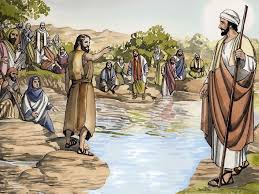 Age thirty was the time young Jewish males were eligible to enter the priesthood. Neither John nor Jesus assumed their contrasting ministries until they were about thirty. Their gifts and calling were different. John was the Last of the Old Testament prophets, Jesus the promised Messiah. A dispensation change was occurring for sure!
Age thirty was the time young Jewish males were eligible to enter the priesthood. Neither John nor Jesus assumed their contrasting ministries until they were about thirty. Their gifts and calling were different. John was the Last of the Old Testament prophets, Jesus the promised Messiah. A dispensation change was occurring for sure!
"In those days John the Baptist appeared in the wilderness of Judea, proclaiming, ‘Repent, for the kingdom of heaven has come near.’ This is the one of whom the prophet Isaiah spoke when he said,
‘The voice of one crying out in the wilderness:Now John wore clothing of camel’s hair with a leather belt around his waist, and his food was locusts and wild honey. Then the people of Jerusalem and all Judea were going out to him, and all the region along the Jordan, and they were baptized by him in the river Jordan, confessing their sins.
“Prepare the way of the Lord,
make his paths straight.” ’
But when he saw many Pharisees and Sadducees coming for baptism, he said to them, ‘You brood of vipers! Who warned you to flee from the wrath to come? Bear fruit worthy of repentance. Do not presume to say to yourselves, “We have Abraham as our ancestor”; for I tell you, God is able from these stones to raise up children to Abraham. Even now the ax is lying at the root of the trees; every tree therefore that does not bear good fruit is cut down and thrown into the fire.
‘I baptize you with water for repentance, but one who is more powerful than I is coming after me; I am not worthy to carry his sandals. He will baptize you with the Holy Spirit and fire. His winnowing-fork is in his hand, and he will clear his threshing-floor and will gather his wheat into the granary; but the chaff he will burn with unquenchable fire.’
Then Jesus came from Galilee to John at the Jordan, to be baptized by him. John would have prevented him, saying, ‘I need to be baptized by you, and do you come to me?’ But Jesus answered him, ‘Let it be so now; for it is proper for us in this way to fulfil all righteousness.’ Then he consented. And when Jesus had been baptized, just as he came up from the water, suddenly the heavens were opened to him and he saw the Spirit of God descending like a dove and alighting on him. And a voice from heaven said, ‘This is my Son, the Beloved, with whom I am well pleased.’
Not much later, John the Baptist was arrested by Herod Antipas and imprisoned at Herod's palace, Machaerus on the Eastern shore of the Dead Sea. John was executed two years later. While in prison, John sent two of his disciples to learn what God had been doing, in his cousin's life in Galilee.
When John heard in prison what the Messiah was doing, he sent word by his disciples and said to him, ‘Are you the one who is to come, or are we to wait for another?’ Jesus answered them, ‘Go and tell John what you hear and see: the blind receive their sight, the lame walk, the lepers are cleansed, the deaf hear, the dead are raised, and the poor have good news brought to them. And blessed is anyone who takes no offence at me.’ (Matthew 11:2-6)
John's disciples then returned to report what they had seen. After they left Jesus commented to His disciples,
As they went away, Jesus began to speak to the crowds about John: ‘What did you go out into the wilderness to look at? A reed shaken by the wind? What then did you go out to see? Someone dressed in soft robes? Look, those who wear soft robes are in royal palaces. What then did you go out to see? A prophet? Yes, I tell you, and more than a prophet. This is the one about whom it is written,
“See, I am sending my messenger ahead of you,
who will prepare your way before you.”
Truly I tell you, among those born of women no one has arisen greater than John the Baptist; yet the least in the kingdom of heaven is greater than he. From the days of John the Baptist until now the kingdom of heaven has suffered violence, and the violent take it by force. For all the prophets and the law prophesied until John came; and if you are willing to accept it, he is Elijah who is to come. Let anyone with ears listen!‘But to what will I compare this generation? It is like children sitting in the market-places and calling to one another,
“We played the flute for you, and you did not dance;
we wailed, and you did not mourn.”
For John came neither eating nor drinking, and they say, “He has a demon”; the Son of Man came eating and drinking, and they say, “Look, a glutton and a drunkard, a friend of tax-collectors and sinners!” Yet wisdom is vindicated by her deeds.’Then he began to reproach the cities in which most of his deeds of power had been done, because they did not repent. ‘Woe to you, Chorazin! Woe to you, Bethsaida! For if the deeds of power done in you had been done in Tyre and Sidon, they would have repented long ago in sackcloth and ashes. But I tell you, on the day of judgement it will be more tolerable for Tyre and Sidon than for you.
And you, Capernaum, will you be exalted to heaven? No, you will be brought down to Hades. For if the deeds of power done in you had been done in Sodom, it would have remained until this day. But I tell you that on the day of judgement it will be more tolerable for the land Sodom than for you.’At that time Jesus said, ‘I thank you, Father, Lord of heaven and earth, because you have hidden these things from the wise and the intelligent and have revealed them to infants; yes, Father, for such was your gracious will. All things have been handed over to me by my Father; and no one knows the Son except the Father, and no one knows the Father except the Son and anyone to whom the Son chooses to reveal him.
‘Come to me, all you that are weary and are carrying heavy burdens, and I will give you rest. Take my yoke upon you, and learn from me; for I am gentle and humble in heart, and you will find rest for your souls. For my yoke is easy, and my burden is light.’ (Matthew 11:7-30)
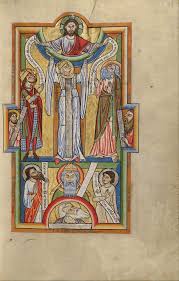
"Then some of the scribes and Pharisees answered, saying, “Teacher, we want to see a sign from You.”
But He answered and said to them, “An evil and adulterous generation seeks after a sign, and no sign will be given to it except the sign of the prophet Jonah. “For as Jonah was three days and three nights in the belly of the great fish, so will the Son of Man be three days and three nights in the heart of the earth. “The men of Nineveh will rise up in the judgment with this generation and condemn it, because they repented at the preaching of Jonah; and indeed a greater than Jonah is here. “The queen of the South will rise up in the judgment with this generation and condemn it, for she came from the ends of the earth to hear the wisdom of Solomon; and indeed a greater than Solomon is here."
(Matthew 12:38-42)
Seeking a Sign
"And while the crowds were thickly gathered together, Jesus began to say, “This is an evil generation. It seeks a sign, and no sign will be given to it except the sign of Jonah the prophet. “For as Jonah became a sign to the Ninevites, so also the Son of Man will be to this generation. “The queen of the South will rise up in the judgment with the men of this generation and condemn them, for she came from the ends of the earth to hear the wisdom of Solomon; and indeed a greater than Solomon is here. “The men of Nineveh will rise up in the judgment with this generation and condemn it, for they repented at the preaching of Jonah; and indeed a greater than Jonah is here. The Lamp of the Body “No one, when he has lit a lamp, puts it in a secret place or under a basket, but on a lampstand, that those who come in may see the light. “The lamp of the body is the eye. Therefore, when your eye is good, your whole body also is full of light. But when your eye is bad, your body also is full of darkness. 35 “Therefore take heed that the light which is in you is not darkness. “If then your whole body is full of light, having no part dark, the whole body will be full of light, as when the bright shining of a lamp gives you light.”
And as He spoke, a certain Pharisee asked Him to dine with him. So He went in and sat down to eat.
When the Pharisee saw it, he marveled that He had not first washed before dinner.
Then the Lord said to him, “Now you Pharisees make the outside of the cup and dish clean, but your inward part is full of greed and wickedness.
“Foolish ones! Did not He who made the outside make the inside also?
“But rather give alms of such things as you have; then indeed all things are clean to you.
“But woe to you Pharisees! For you tithe mint and rue and all manner of herbs, and pass by justice and the love of God. These you ought to have done, without leaving the others undone.
“Woe to you Pharisees! For you love the best seats in the synagogues and greetings in the marketplaces. “Woe to you, scribes and Pharisees, hypocrites! For you are like graves which are not seen, and the men who walk over them are not aware of them.” Then one of the lawyers answered and said to Him, “Teacher, by saying these things You reproach us also.” And He said, “Woe to you also, lawyers! For you load men with burdens hard to bear, and you yourselves do not touch the burdens with one of your fingers.
“Woe to you! For you build the tombs of the prophets, and your fathers killed them.
“In fact, you bear witness that you approve the deeds of your fathers; for they indeed killed them, and you build their tombs.
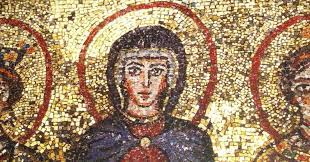
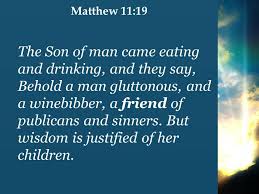 “Therefore the wisdom of God also said, ‘I will send them prophets and apostles, and some of them they will kill and persecute,’ “that the blood of all the prophets which was shed from the foundation of the world may be required of this generation, “from the blood of Abel to the blood of Zechariah who perished between the altar and the temple. Yes, I say to you, it shall be required of this generation.
“Therefore the wisdom of God also said, ‘I will send them prophets and apostles, and some of them they will kill and persecute,’ “that the blood of all the prophets which was shed from the foundation of the world may be required of this generation, “from the blood of Abel to the blood of Zechariah who perished between the altar and the temple. Yes, I say to you, it shall be required of this generation.
“Woe to you lawyers! For you have taken away the key of knowledge. You did not enter in yourselves, and those who were entering in you hindered.”
And as He said these things to them, the scribes and the Pharisees began to assail Him vehemently, and to cross-examine Him about many things,
lying in wait for Him, and seeking to catch Him in something He might say, that they might accuse Him. (Luke 11:29-49)
What does it mean that wisdom is justified by her children (Matthew 11:19)?John had served faithfully as the forerunner to the Messiah, announcing the coming kingdom of Jesus, yet, instead of enjoying the fruits of his labor and the glories that one might expect in a newly installed kingdom, John was in prison soon to be executed—no kingdom had actually yet arrived. It seems that because of his circumstances he suffered some doubts and sent messengers to ask Jesus whether He was the expected One or whether John should look for someone else (Matthew 11:3). Jesus responded to John’s query with patience and grace, reminding John of the miracles prophesied of the Messiah that Jesus was accomplishing (Matthew 11:5–6). After that powerful yet gracious affirmation, Jesus continued, reminding listeners of the importance of John and his ministry. John was a mighty prophet, but he was more than just a prophet (Matthew 11:7–9)—he fulfilled the prophecy of Malachi 3:1 and faithfully served as the forerunner to the Messiah, announcing the coming kingdom. John would be an important piece in that kingdom even if it wouldn’t come right away. Before the kingdom would be inaugurated, people would be continually trying to install the kingdom by force: “From the days of John the Baptist until now the kingdom of heaven suffers violence, and the violent take it by force” (Matthew 11:12, NKJV. Jesus prescribed seeking the kingdom through the righteousness. If the people were willing to receive the King and His kingdom, then John would also have fulfilled the prophecy in Malachi 4:6 of Elijah the prophet preceding the great and awesome day of the Lord (Matthew 11:14). Jesus then chastises that generation for their disrespect of both John and Himself, and He observes that “wisdom is justified by her children” (Matthew 11:19, NKJV) or “wisdom is proved right by her deeds” (NIV). That generation was inconsistent in their judgments. They behaved like children who wanted to but couldn’t control other children (Matthew 11:16–17). They critiqued John for not eating and drinking with other people (Matthew 11:18), but when Jesus came eating and drinking with people, they criticized Him for doing it (Matthew 11:19). That generation was prideful, thinking they had the wisdom to judge rightly, but they illustrated the injustice of their judgments. In so doing they failed to recognize the forerunner to the Messiah and thus failed to receive the Messiah and His kingdom. When Jesus challenged His listeners that wisdom is justified by her children, He was saying that the soundness of wisdom can be judged by the fruit of that wisdom. The people of that generation thought they had sound wisdom and were prideful in their own ability to discern and judge. But Jesus challenged their wisdom by looking at the “children” of their wisdom—what did their “wisdom” produce? Their deeds were woeful, in that they failed to recognize both the forerunner of the Messiah and the Messiah Himself. It is remarkable that those who had spiritual pride and confidence in themselves Jesus rebuked soundly, while the one who was struggling with doubt Jesus affirmed and encouraged. Jesus had reminded John that Jesus was the King and that John was the forerunner, but it was important not to stumble over the King and His methods (Matthew 11:6). On the other hand, Jesus chastised those who had made arrogant and wrongful judgments against John and Jesus. This is an important reminder that God is patient with His children even when they are doubting, but God opposes the proud and gives grace to the humble (James 4:6). We should never be arrogant in our judgments but should develop our conclusions humbly and by seeking God’s wisdom revealed in His Word, just as Jesus was encouraging John to do. (Got Questions). |
Wisdom Calls!
Does not wisdom call, Wisdom’s Part in Creation The Lord created me at the beginning of his work, |
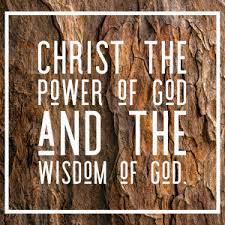
We are nearing the end of what has been a very difficult year, one of the most troubled of this century. The worst airline accidents in history have occurred during the past year. Terrorism has been rampant during 1985. Just last week we were sobered by the terrible slaughter of innocent people, including children, in the airports at Rome and Vienna. Violence is increasing, and the forces of law and order seem more and more helpless to control it. All this makes us wonder what is coming down as the century draws to a close. Many, especially those of us who are parents and grandparents, wonder what kind of world our children and grandchildren will inherit. Is it going to go on forever like this, growing worse and worse as time goes by?
The secular answers to that question are not encouraging. Most commentators see increasing difficulty and trouble ahead. The few optimistic forecasts we hear sound like so much whistling in the dark. But the Christian answer, which is what we are concerned about, is very beautifully expressed in a great passage out of the book of Hebrews There the writer says, "We do not yet see all things subjected to man," (Hebrews 2:8). That is certainly true of our world today. He goes on to say, "But we see Jesus, crowned with glory and honor, though for a little while he was made lower than the angels, for the suffering of death, that he might taste death for every man," Hebrews 2:9).
"But we see Jesus." That is the theme also of this section in Isaiah to which we come this morning. The eleventh and twelfth chapters of this great prophecy clearly look on to the coming of the Messiah. All the Jewish commentators agree that this is a Messianic passage, although they do not, of course, believe that the Messiah is as Jesus. Here are Isaiah's words,
There shall come forth a shoot from the stump of Jesse,
and a branch shall grow out of his roots.
And the Spirit of the Lord shall rest upon him,
the spirit of wisdom and understanding,
the spirit of counsel and might,
the spirit of knowledge and the fear of the Lord.
And his delight shall be in the fear of the Lord.
He shall not judge by what his eyes see,
or decide by what his ears hear;
but with righteousness he shall judge the poor,
and decide with equity for the meek of the earth. (Isaiah 11:1-4a RSV)
It is not difficult for us to see there a clear prediction of the Lord Jesus. Here in these opening verses is a hint that the Messiah will appear in history in a very obscure way. That is suggested by this word, "There shall come forth a shoot from the stump of Jesse." Like a great tree that has been cut down, the ancestry of Jesus represented in David and his father Jesse has been reduced to obscurity and insignificance. But out of that lowly stump will arise a shoot, a single sprout, a man who will, as the prophet goes on to say, be filled with the Spirit of God and who will do a great work in the land. When our Lord is referred to as "the son of David" in the gospels, it is always in terms of royal glory, but when he is called the "root of Jesse," it is a reference to his humble beginnings.
The prophet not only sees the ancestry of Jesus, but he sees him in his Spirit-filled ministry. "The Spirit of the Lord (of Yahweh), shall rest upon him," he says. That Spirit consists of six spirits (for a total of seven): "the Spirit of the Lord, the spirit of wisdom, the spirit of understanding, the spirit of counsel, the spirit of might, the spirit of the knowledge of the Lord and the fear of the Lord." It is rather striking that this passage corresponds to the Jewish candlestick, the Menorah. A Menorah has a central staff that parallels this word, "the Spirit of the Lord will rest upon him." Linked to that central staff are three pairs of lightholders. These correspond to what we have in this passage. "The spirit of wisdom and of knowledge, or understanding," are linked together; likewise the "spirit of counsel and of might," and the "spirit of the knowledge of the Lord and the spirit of the fear of the Lord." Thus, they are illustrated by the Jewish symbol of the Menorah, the candlestick that burned in the tabernacle throughout the centuries.
As you observe these pairs more closely, you can see that they do indeed describe Jesus of Nazareth. The first pair, "the spirit of wisdom and of knowledge," speak of his amazing insight into human affairs. Wisdom is the knowledge of the nature of things, while understanding is the awareness of the differences between them. How clearly Jesus reflected these in his ministry! One of the symbols of our age is the psychiatrist's couch. Psychiatrists and psychologists have their patients lie on a couch and ask them questions in an effort to understand their problems. Perhaps you have heard of the two psychiatrists who met in an elevator. One of them said, "You're fine. How am I?" This humorously suggests the way we try to come to an understanding of ourselves and of others. But our Lord never used a couch for he never had to ask questions. John's gospel says, "Jesus needed not that any man tell him what was in man because he knew man." He knew the Hebrew and Hebrew thinking, the Greek and the Greek way of thinking. When either came to him he always dealt with them according to the way they had been brought up and taught.
I have always appreciated that wonderful first chapter of John's gospel that gives the account of our Lord calling his disciples. Andrew was the first one called. Andrew, that canny, cautious man. No wonder he has become the patron saint of Scotland! I always think of him as a Scotsman in a Jewish body. Andrew was deep and cautious, but when he let go there was an explosion. That is why we have named the great earthquake fault that runs through California, the San Andreas Fault! According to John, when Jesus met Andrew he went home with him and spent the whole day with him. It takes that long to get through to a man like Andrew.
Andrew's brother, Peter, is quite different. He is bold, impulsive, ambitious, outspoken. Jesus said to him, "Your name is Simon, but you shall be called Peter, a rock," John 1:42). Impulsive, unstable Simon wanted to be a rock, and our Lord recognized immediately the hunger of his heart. When he promised to fulfill Peter's dream he had his man.
Next, Jesus "found" Philip. Shy, mousy Philip never says much. He did not find Jesus, Jesus found him. Looking into Philip's eyes, he said but two words, "Follow me," (John 1:43). When Philip knew Jesus wanted him he was captivated by what he saw.
The fourth disciple whom Jesus called, Nathaniel, was still different. He was the open-hearted, honest type who believed whatever was told him. Jesus discerned that. That is why he said of him, "Behold, an Israelite in whom there is no guile," (John 1:47). There was no deceitfulness in him. As our Lord flashes the truth of each man's life upon him, each one begins to know himself better than ever before. That is the beauty of this prediction here in Isaiah, that upon him shall rest "the spirit of wisdom and understanding."
The second pair, "the spirit of counsel and of might," speak of authority. Counsel is the ability to give good and right advice, while might is the ability to help carry it out. This is described even more fully in the words in verse three, "He shall not judge by what his eyes see, or decide by what his ears hear; but with righteousness he shall judge the poor, and decide with equity for the meek of the earth." What a wonderful description of Jesus as he met with people. He does not judge Nicodemus, one of the greatest of religious authorities in the nation, by his outward words or posture. He sees immediately that this man knows virtually nothing about the spiritual life, so he begins with the ABC's and speaks of the vital things that introduce one to the kingdom of God. He spoke of truth that you can never find out by human powers. He described how the angels live, what happens after death, how prayer works, how the devil works. These he described with full authority. He did not have to study reference books, but rather spoke so that men hearing him said, "No man ever spake like this man," (John 7:46 KJV). Yes, upon him rested "the spirit of counsel and of might."
The third pair, "the spirit of knowledge and the fear of the Lord," speak of our Lord's intimate relationship to the Father. Out of that flows the marvelous serenity of his life. He is never taken by surprise. He always seems to be master of the occasion. This grows out of his full awareness of the mind of God. He said on one occasion, "You do not know Him, but I know Him," (John 8:55). He came to reveal to us the mind of the Father, the graciousness, compassion, truthfulness and faithfulness of God. As we read what he said it is obvious that it all grew out of his "knowledge of the Lord and his fear of the Lord." This is not speaking of fear that he will be punished, but of his reverent respect for the Being of the Father. He does not want to displease him. "I do always those things that please I him," he said.
Some years ago I ran across a statement that I felt was descriptive of our Lord's ministry in this regard. It is titled, Twelve Things That The Lord Jesus Never Did. What remarkable things they are:
First, "He never sought advice." He never went about asking, "What do you think about this?" We must do that daily, but he did not. Second, "He never changed his mind." He never said, "l agree that I said that, but I have been having second thoughts about it." Even our greatest leaders must admit to that, but Jesus never changed his mind.
Third, "He never was in a hurry." He must have frequently read that great verse in the book of Isaiah, "He that believes need not make haste." Fourth, "He never showed personal fear." When you fear the Lord, you do not fear anything else. Remember the words in Hebrews "I will never leave you nor forsake you, therefore what can any man do unto me?" ( Hebrews13:5). Our Lord never showed personal fear. Fifth, "He never made a mistake." He never had to say, "I did the wrong thing there."
And six through twelve: "He never showed surprise. He never was defeated in a controversy. He never performed a selfish miracle. He never distrusted God. He never denied a good request. He never confessed a sin. He never apologized for anything."
How fully these words of Isaiah are fulfilled in the ministry of this marvelous Man of Galilee! Upon him rested, in all its fullness, "the Spirit of the Lord, the spirit of wisdom and knowledge, of counsel and might, and of the knowledge of and the fear of the Lord." Thus, "His delight shall be in the fear of the Lord."
In the middle of Verse 4 is another one of those leaps in time, arching across the centuries to the time when Jesus comes once again. We must bear these in mind as we read this book of Isaiah, and others of the prophets also. The Old Testament is written so as to bring together the two comings of Jesus as though they were one. The Apostle Peter in his first letter says, "The prophets spoke of the sufferings of Christ and the glory that should follow," (1 Peter 1:11 KJV). But they gave no indication of the great valley of time that lies in between. The "sufferings" came at one period of history, the "glory that should follow" will come at another.
This is what throws the Jews off in their understanding of these prophecies, and why they feel that Jesus did not fulfill the prophecies of the Messiah. Those prophecies that speak of his triumph are only to be fulfilled when he comes again. We must remember the Lord's words to his disciples, recorded in the book of Acts, when they asked him, "Will you at this time restore the kingdom unto Israel?" Acts 1:6). Here is his amazing answer, one we too frequently ignore: "It is not for you to know the times and the seasons (I wish many of our modern-day prophets would hear that!) which the Father has put in his own power," Acts 1:7). He did not answer their question because it was not for them to know. Thus questions of time with regard to prophecy are highly indeterminate.
Here, then, is one of those leaps in time. In the middle of this verse we are carried forward to the time when he shall come again, not as a gentle, loving healer and counselor of men, but, as the prophet says,
...he shall smite the earth with the rod of his mouth,
and with the breath of his lips he shall slay the wicked.
Righteousness shall be the girdle of his waist,
and faithfulness the girdle of his loins. (Isaiah 11:4b-5 RSV)
That is quite a different picture of Jesus, yet to be fulfilled. This "smiting of the earth" is described in several places in the Scripture, most notably in the book of Revelation. Here is what John wrote in his great vision, clearly describing the same thing as Isaiah:
Then I saw heaven opened, and behold, a white horse! He who sat upon it is called Faithful and True, and in righteousness he judges and makes war. (Revelation 19:11 RSV)
Remember that Isaiah had said, "Righteousness shall be the girdle of his waist and faithfulness the girdle of his loins." John continues,
His eyes are like a flame of fire, and on his head are many diadems; and he has a name inscribed which no one knows but himself. He is clad in a robe dipped in blood [which speaks of his death], and the name by which he is called is The Word of God. (Revelation 19:12-13 RSV)
From his mouth issues a sharp sword with which to smite the nations, and he will rule them with a rod of iron [The very phrase taken from Isaiah's prophecy]; he will tread the wine press of the fury of the wrath of God the Almighty. On his robe and on his thigh he has a name inscribed, King of kings and Lord of lords. (Revelation 1:15-16 RSV)
Both Isaiah and John reveal that Jesus is the hope of this world. He is the Man that men cannot forget.
This week I saw an advertisement for a newly published book, "Jesus Through the Centuries." The writer says, "Regardless of what anyone may personally think or believe about him, Jesus of Nazareth has been the dominant figure in the history of western culture for almost twenty centuries. It is from his birth that most of the human race dates its calendars. It is by his name that millions curse, and in his name that millions pray."
The world cannot forget Jesus because he is the Lord of this world. He is crowned with glory and honor and will come again, as Isaiah says, "to smite the earth with the rod of his mouth."
Many people, especially many churchgoers, do not like this picture of Jesus. They say, "Imagine describing 'gentle Jesus meek and mild' as ruling with a rod of iron! These are contradictory ideas. This image does not correspond with the character he manifested." That attitude betrays a tremendous ignorance of the nature of truth. Truth is always ruthless. It does not tolerate error:
The phone book is ruthless in its refusal to tolerate error. It does not give a list of names and tell you to choose your own number. You must call exactly the number that is listed. If you get the digits wrong, you will not get the person you are trying to reach.
The IRS is very ruthless and narrow-minded about the truth. They do not tell you to guess how much you made and let them know. No, they insist that you give them exact figures. They even check up on you so that if you do not put it all down, you will get a phone call that scares the living daylights out of you. They became quite intolerant about it.
What this world needs more than anything else, if I may say so, is someone who will rule with a rod of iron, someone who will mean what he says. We seem to be afflicted with a plethora of mealy-mouthed politicians and gutless bureaucrats who refuse to face up to issues. We have just been treated to a view of Congress pussyfooting around the issues of debt repayment and tax reform. They will not do anything about these critical things until they are forced to because they are unwilling to face the unpleasant truth. What a tremendous joy to know there is coming One who will do what he says. You can count on it. Oh, for men of iron who mean what they say and back up their words with deeds!
Somebody asked me this morning, "If pro is the opposite of con, what is the opposite of progress?" The answer, of course, is, "Congress." But I suppose we should be thankful for small mercies. As Will Rogers said, "We ought to be grateful that we don't get as much government as we pay for!" What a treat it is to read there is someone coming who is going to rule the earth in righteousness and faithfulness.
"The rod of his mouth" is the Word of God, specifically the word of the cross, the cross of Jesus that ruthlessly puts to death the old self in us. It has been said that if Jesus went into any peace conference today he could settle the world's problems with just three little words: "Love your enemies." Everyone knows Jesus is right. If we would love our enemies, as he tells us to do, we could end the arms race, destroy our instruments of death and fulfill all the dreams of these sincere peace demonstrators who long for peace but do not know how to achieve it. Why can't we do that? We know why. There is something in all of us that becomes angry when we are attacked, that makes us want to strike back and get even. It is what produces the horrible cycles of murder, war, and pillage that are repeated from century to century in the history of man. Our Lord puts that to death by the Word of the Cross.
What good is a doctor who tells you that your cancer does not matter? You want a surgeon with a resolute will and a sharp knife to cut it out and get rid of it. That is what Isaiah is promising. There is coming One who will deal earnestly, honestly, and thoroughly with the evil of man. That is why he is coming to "smite the earth."
What does this lead to? Isaiah looks further on, beyond the trouble that we are headed for -- recorded in the book of Revelation and other places. He sees there is coming a wholly different scene, which he describes in this way:
The wolf shall dwell with the lamb,
and the leopard shall lie down with the kid,
and the calf and the lion and the fatling together,
and a little child shall lead them.
The cow and the bear shall feed;
their young shall lie down together;
and the lion shall eat straw like the ox.
The sucking child shall play over the hole of the asp,
and the weaned child shall put his hand on the adder's den.
They shall not hurt or destroy
in all my holy mountain;
for the earth shall be full of the knowledge of the Lord
as the waters cover the sea. (Isaiah 11:6-9 RSV)
What a beautiful picture! Here is the time when the dreams of men will be fulfilled, when all the longings that reflect themselves in peace demonstrations and cries for disarmament will find their fulfillment. There is a deep hunger in mankind for this kind of a world, although we do not know how to achieve it. But there is coming One who does know how. Then, even the animals will lose their ferocity and lie down one with another. How would you mothers feel if you found your child playing with a cobra? But there is coming a time when it shall happen, when the animals shall lose their ferocity against one another, when the lion shall eat straw like the ox."
Some people ask, "Is this literal or is it only symbolic! Is this all metaphor?" Some commentators say this is a picture of the work of Christ in human hearts today. I believe that. I believe this is metaphor, picturing spiritual peace.
I think of our church elders in those terms. One of them is like a lion; he roars every time you cross him. Another one is like a great bear; he swallows you up as you come into contact with him. Another is like a leopard -- sneaky. We even had one named Wolfe. And here was I, a meek lamb in the midst of them! Our elders' meetings sometimes give that impression, but when we would look to the Lord he comes among us as a great lion tamer. Then the lion lies down with the lamb, the wolf and the leopard dwell together and everything works out. This is what our Lord has power to do in human hearts today. He can heal controversy and bring peace among men.
But I also believe this is literal. There is coming a day when the curse will be removed from the earth. Paul sings about a day when creation shall be released form its bondage, calling it the day of "the manifestation of the sons of God," (Romans 8:19 KJV). Then the curse will be removed and the whole earth will break into a verdant blooming, the like of which we have never seen; when "the desert shall blossom like the rose," as Isaiah describes it in Chapter 35. The animals lose their ferocity and even the carnivores return to eating grass, as in the unfallen creation.
There are other changes as well. In the rest of this chapter and Chapter 12, four times Isaiah uses the phrase "in that day," Verse 10:
In that day the root of Jesse shall stand as an ensign [a banner, a symbol] to the peoples; him shall the nations seek, and his dwellings shall be glorious. (Isaiah 11:10 RSV)
That summarizes all the predictions about the restoration of Jerusalem as the center of the earth. The Lord Jesus shall reign in person in Jerusalem. He himself is the banner which the nations shall seek, "and his dwellings shall be glorious." It is the millennial Temple and the redeemed city. In Verse 11 there is another use of the phrase "in that day":
In that day the Lord will extend his hand yet a second time to recover the remnant which is left of his people, (Isaiah 11:11a RSV)
The first time was when he called them out of Egypt. Some think this "second time" is referring to the Babylonian captivity, but when the Israelites came back from Babylon they were still not an independent people. This will be a time when they shall be in their own land as their own rulers. But they will be "a remnant." That word always means believers. Some people ask today, "Is the present return of Israel the fulfillment of these verses? Is God now calling back his outcasts?" It sounds that way for if you read on, it says they shall come,
...from Assyria, from Egypt, from Pathros, from Ethiopia, from Elam, from Shinar, from Hamath, and from the coastlands of the sea.
He will raise an ensign for the nations,
and will assemble the outcasts of Israel,
and gather the dispersed of Judah
from the four corners of the earth.
The jealousy of Ephraim shall depart,
and those who harass Judah shall be cut off;
Ephraim shall not be jealous of Judah,
and Judah shall not harass Ephraim. (Isaiah 11:11b-13 RSV)
That is, the division between the ten tribes in the north and the two in the south will be healed and Israel shall be at peace in their own land. Is the present return that? No, clearly not. This passage is talking about believers who are gathered back; the believing "remnant" of the people. Only a mere handful of believing Jews have returned in our day. Most of them are not even religious. Israel today is a secular state, though it is necessary for it to be there as a preparation for these days, it is not the fulfillment of these verses. Nor is it the direct hand of God that has brought them back from the far-flung nations of the earth as will happen in that day.
When they come, they shall overcome their enemies. Verse 14:
But they shall swoop down upon the shoulder of the Philistines in the west,
and together they shall plunder the people of the east.
They shall put forth their hand against Edom and Moab,
and the Ammonites shall obey them. (Isaiah 11:14 RSV)
Moab, Edom and the Ammonites are peculiar nations in the Scripture. They were relatives, yet enemies, of Israel. The Edomites are the descendants of Esau, the brother of Jacob; while Moab and Ammon were the sons of Lot, the nephew of Abraham. Yet although they were related, they were long-term enemies of Israel. Therefore, God said, "You shall not destroy them." He has a future for them as well. Spiritually, it speaks of an enemy we have within us that is related to us, called "the flesh" in the New Testament."In that day geographical changes will occur, as well. Verse 15:
The Lord will utterly destroy
the tongue of the sea of Egypt; (Isaiah 11:15a RSV)
This week I read a scientific article about the tectonic plates upon which Asia and Africa are located, which are now shifting. The scientists are predicting that they will drift apart in places and come together in others. "The tongue of the sea" is the Gulf of Suez which, according to this, shall disappear; it shall be literally "banned."
and He will wave his hand over the River; (Isaiah 11:15b RSV)
I think that is the Jordan, though some take it to be the Euphrates. When Israel came out of Egypt they passed through the Red Sea, through the Gulf of Suez, and also passed through the Jordan River.
...he will wave his hand over the River
with his scorching wind,
and smite it into seven channels
that men may cross dryshod.
And there will be a highway from Assyria [that is the present country of Iraq]
for the remnant which is left of his people,
as there was for Israel
when they came up from the land of Egypt. (Isaiah 11:15b-16 RSV)
There are some physical changes coming in that section of the world, which is located in the Rift Valley, one of the great natural gaps in the crust of the earth. Massive earthquakes are bound to happen in the future, as the book of Revelation describes.
Chapter 12 has two more references to "that day" This is still part of the same vision as in Chapter 11:
You will say in that day:
"I will give thanks to thee, O Lord,
for though thou wast angry with me,
thy anger turned away,
and thou didst comfort me." (Isaiah 12:1 RSV)
This is the song of the redeemed of Israel, now restored to the Lord's mercies,
"Behold, God is my salvation;
I will trust, and will not be afraid;
for the Lord God is my strength and my song,
and he has become my salvation." (Isaiah 12:2 RSV)
What a marvelous picture of a relationship yet to come for Israel! The first part concludes with these words:
With joy you will draw water from the wells of salvation. (Isaiah 12:3 RSV)
Immediately we are reminded of Jesus' words to the woman at the well of Samaria: "If you believe in me, you can draw from me living water and you will never thirst again," (John 4:7-15). It is a picture of taking from the Lord the emotional strength we need. But what is to be fulfilled in the future in Israel is already available to believers now by the Spirit, from whom we can draw the needs of our spirit. The antidote to fear is faith; the antidote to depression is the joy of the Lord; the antidote to distress of mind and heart is peace of mind. This we can take from him, as we "draw water from the wells of salvation." The final outcome is that Israel will proclaim this in all the earth:
And you will say in that day:
"Give thanks to the Lord,
call upon his name;
make known his deeds among the nations,
proclaim that his name is exalted."Sing praises to the Lord, for he has done gloriously;
let this be known in all the earth.
Shout, and sing for joy, O inhabitant of Zion,
for great in your midst is the Holy One of Israel." (Isaiah 12:4:6 RSV)
That brings us to the application in our own lives: If we have learned to walk daily in fellowship with "the Holy One of Israel" we, too, will want to "give thanks to the Lord, call upon his name, and make known his deeds among the nations."
Have you found that "great in your midst is the Holy One of Israel"? One Christian has described his experience in these words:
A Song in the Night
In the heat of the day,
I have Jesus.
For a rest on the way,
I have Jesus.
In the calm of the morn,
When a new day is born,
In the midnight hour,
When dark clouds lower,
For each need of my heart,
I have Jesus.
For all of my life,
I have Jesus.
Mid clamor and strife,
I have Jesus.
For protection from harm,
And all sudden alarm,
For provision for need,
For His Spirit to lead,
For each moment I live,
I have Jesus.
He will never depart,
I have Jesus.
To meet Satan's dart,
I have Jesus.
He holds my weak hand,
And gives strength to stand,
He pours from His Throne,
Plenteous grace for his own,
So I sing and I praise
Precious Jesus!
"How great in your midst is the Holy One of Israel."
Proverbs 4:5-9 KJV
Get wisdom, get understanding: Forget it not; neither decline from the words of my mouth.
Forsake her not, and she shall preserve thee: Love her, and she shall keep thee.
Wisdom is the principal thing; therefore get wisdom:
And with all thy getting get understanding. Exalt her, and she shall promote thee:
She shall bring thee to honour, when thou dost embrace her.
She shall give to thine head an ornament of grace: A crown of glory shall she deliver to thee.
![]()
Down through church history Protestant Churches and especially the Roman Catholic Church have argued among themselves about how exactly God governs the affairs of men and angels. The Theological debate is subsumed under the title “Dispensationalism.” Many profession Christians and entire denominations have ignored the lively debates and defaulted into strange sounding beliefs such as Preterism, replacement theology, amillennialism. Usually this has happened because of our failure to take the whole counsel of God seriously from start to finish. Serious compromises with secular philosophy have pockmarked the history of the professing church for twenty centuries. But today fewer still Christians in America care little about doctrinal nuances or fine points. Those churches whose identity depends entirely on sound doctrine are disappearing rapidly from the places they once held in American society. Younger people have often been confused by dozens of churches preaching that they alone were authorized spokesmen for the One God. The content of Christian belief as represented by many churches has dropped precipitously.
The backdrop of Constantine the rest and dogma in this 500 year old controversy is the Roman Catholic Church, rich and powerful, dating back to Constantine. (306-337 AD).
Yet the New Testament declares that our Creator has been in full control of everything at all levels of the Macrocosm and the Microcosm. Yes, the style of His Household management is not the same as it was before the Flood of Noah, or before the giving of the Law on Mt. Sinai, etc. The late Dr. Charles Ryrie explains as follows:
"The principal characteristic of a dispensation is the economic arrangement and responsibility that God reveals in each dispensation. Such responsibility is a test in itself. Most men fail the test, and then judgment follows. The Dispensational scheme has two perspectives: a cross-sectional aspect (which is sometimes misconstrued as cycles but which is in reality a spiral) and a longitudinal aspect (which emphasizes the unfolding progress of revelation and continuing principles throughout the ages of the dispensations). For example:
Thus, Dispensationalism is not just some theological "construct" teasing out academic particulars so that it can be different from other interpretations like Reformed Theology or Roman Catholicism. The failures found in Dispensational theology's dispensations uniquely validates God's word both by history and current events. Simply look around today and look at the strength of the denominational churches. See how watered down and diluted they have become. The modern church has suffered death by a thousand cuts, splintering and crushing professing Christendom under the weight of political correctness, governmental overreach, and the deconstruction of civil society. The failures highlighted by Dispensational theology has everything to do with the reality we are currently living in, the future of America and the Church, and the end of our age."
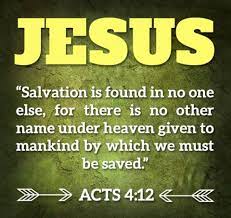
The Near Future of Planet Earth
Ray Stedman on Dispensationalism
Malachi the Prophet
Progressive Dispensationalism by Zola Levitt
Entering a New Dispensation (2020)
The Management of the Universe
The Wife of Jehovah, The Bride of Christ
The Royal Road to Wholeness
Love and Relationships
Keys to the Song of Solomon
Yin, Yang, the Tao, and Wholeness
__________________________________________________-
A Glorious Church
I Sing the Mighty Power of God
Jesus, The Light of the World
______________________________________________________
Following Jesus, Henri J. M. Nouwen
The Book that Made Your World, Vishal Mangalwadi
![]()
Lambert Dolphin


Lambert Dolphin's Main Library
Email is welcome: Lambert Dolphin
Archive for Newsletters
Library Annex (800+ new articles since 2018. Free, help thyself)
 February 10, 2022, August 12, 2022. May 6, 2023 September 21, 2023.
February 10, 2022, August 12, 2022. May 6, 2023 September 21, 2023.